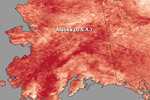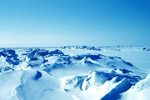Yesterday, the European Parliament passed a resolution supporting the creation of an Arctic Sanctuary covering the vast high Arctic around the North Pole, giving official status to an idea that has been pushed by activists for years. Still, the sanctuary has a long road to go before becoming a reality: as Arctic sea ice rapidly declines due to climate change, there has been rising interest from governments and industries to exploit the once inaccessible wilderness for fish and fossil fuels.
The proposed sanctuary, lying outside of Exclusive Economic Zones, would cover “one of the largest and least exploited areas on Earth: a 2.8 million square kilometer zone of the global commons,” writes Neil Hamilton, Senior Political Advisor Polar with Greenpeace Norway, in a blog. “That would be the biggest conservation zone in existence, protecting fish stocks, ice-dependent species, and a huge variety of cold water species.”
Greenpeace has been campaigning for a global Arctic Sanctuary for several years, including gathering some 5 million signatures from around the world.
In addition to supporting an Arctic Sanctuary, the European Parliament’s resolution would ban fisheries in the high Arctic seas “until the establishment of appropriate regulatory mechanisms and protection.” Similarly, the resolution calls for “strict precautionary regulatory standards” when it comes to fossil fuel exploration and extraction in the region, but leaves the door open for the ongoing energy race at the top of the world.

Climate change is imperiling many Arctic species, including walrus who depend on thick sea ice for giving birth. Photo by: USFWS/Joel Garlich-Miller.
Last December, Russian company Gazprom become the first energy company to begin pumping oil out of the Arctic seabed. In response to this the European Parliament expresses “strong concern regarding the rush for oil exploration and drilling in the Arctic without adequate standards being enforced.”
Finally, the resolution notes that the consequences of a rapidly-changing Arctic will ripple through Europe: “climate changes in the Arctic will have a major impact on coastal regions globally, including coastal regions in the European Union, and on climate-dependent sectors in Europe such as agriculture and fisheries, energy, reindeer herding, hunting, tourism and transport.”
The Arctic is warming faster than anywhere in the world due to climate change. In fact, according to a recent paper in Quarterly Journal of the Royal Meteorological Society the region is warming eight times faster than the rest of the planet, leading to vast ecological upheaval.
Still, according to Greenpeace, the establishment of an Arctic Sanctuary is likely to be opposed by a number of Arctic nations, such as Canada, Russia, Denmark, and Norway. At least one Arctic country, Finland, officially approves the idea, however.
“[The resolution] is a direct challenge to the small group of countries who are rushing to open up the fragile Arctic for oil drilling and industrial fishing. The status quo is starting to crack, and this now demands a real response from those who see the melting Arctic simply as a new source of profit,” said Greenpeace activist Sini Saarela of Finland. Saarela was one of the “Arctic 30,” a group of activists and journalists who were arrested by Russian military while protesting oil exploitation in the region. After being detained for two months, the activists were granted amnesty by Russian President, Vladimir Putin.

Arctic sea ice volume (not extent) from 1979 to Spring 2013. Note: the graph does not show last year’s low.

MODIS satellite image of the Arctic. Photo by: NASA.
Citations:
- Kevin Cowtanand Robert G. Way. (2013) Coverage bias in the HadCRUT4 temperature series and its
impact on recent temperature trends. Quarterly Journal of the Royal Meteorological Society. doi:10.1002/qj.2297
Related articles

(02/24/2014) An assessment of ocean acidification, presented at the UN Climate Change Conference in Warsaw in November 2013, starkly concluded that acidity is on track to rise 170 percent by the end of this century. As many key species are sensitive to changes in acidity, this would drastically impact ocean ecosystems, with effects especially pronounced in polar regions where the cold waters intensify acidification, and which are home to many organisms that are particularly vulnerable to acidification.
Alaska roasting: new NASA map shows the Final Frontier in grip of January heatwave

(02/05/2014) Alaska got California weather at the end of January, as displayed by a new map based on data by NASA’s Terra satellite’s Moderate Resolution Imaging Spectroradiometer (MODIS). The U.S. state experiences one of its warmest winter periods on record during the second half of January, including some temperatures that ran 40 degrees Fahrenheit (22 degrees Celsius) above average. According to the EPA, temperatures in Alaska have risen an average of 3.4 degrees Fahrenheit (1.9 degrees Celsius) in just the last 50 years due to climate change.
Shell drops plans to drill in the Arctic for now
(01/30/2014) Facing plunging profits, Royal Dutch Shell has announced it will cut exploration and development funding by nearly $10 billion this year, including halting their long-suffering plans to drill in the Arctic ocean. Shell’s new CEO, Ben van Beurden, made the announcement yesterday that controversial plans to drill off the Alaskan coast will be put on hold for another year.
Underestimating global warming: gaps in Arctic temperature data lead scientists and public astray

(01/15/2014) No place on Earth is heating up faster than the Arctic, but just how fast has remained an open question due to large gaps in temperature data across the vast region. Now, a recent study in the Quarterly Journal of the Royal Meteorological Society finds that not only is the Arctic warming eight times faster than the rest of the planet, but failure to account for temperature gaps has led global datasets to underestimate the rise of temperatures worldwide.
World first: Russia begins pumping oil from Arctic seabed
(12/23/2013) Oil has begun to be pumped from the Arctic seabed, according to Russian oil giant, Gazprom. The company announced on Friday that it has begun exploiting oil reserves at the offshore field of Prirazlomnoye. The project, which is several years behind schedule, is hugely controversial and made international headlines in September after Russian military arrested 28 Greenpeace activists protesting the operation along with a British journalist and Russian videographer.
Russia charges imprisoned Greenpeace protestors with hooliganism, instead of piracy
(10/24/2013) Russian investigators announced on Wednesday they are dropping piracy charges against 28 environmental activists and two freelance journalists who have spent a month in custody since they were seized aboard Greenpeace’s boat, the Arctic Sunrise.
Russia charges non-violent activists with ‘piracy’ for protesting Arctic oil drilling
(10/07/2013) In what is being described by Greenpeace as an ‘imaginary offense,’ Russia has charged 30 people with piracy after activists protested against oil exploitation in the Arctic. The 30 charged included not only protestors, but a British journalist and Russian videographer who were on board Greenpeace’s ship, the Arctic Sunrise, when it was stormed by the Russian military late last month.
‘Heading towards an ice-free Arctic’: sea ice extent hits sixth lowest on record

(09/18/2013) Sea ice cover in the Arctic shrank to one of its smallest extents on record this week, bringing forward the days of an entirely ice-free Arctic during the summer. The annual sea ice minimum of 5,099m sq km reached on 13 September was not as extreme as last year, when the collapse of sea ice cover broke all previous records.